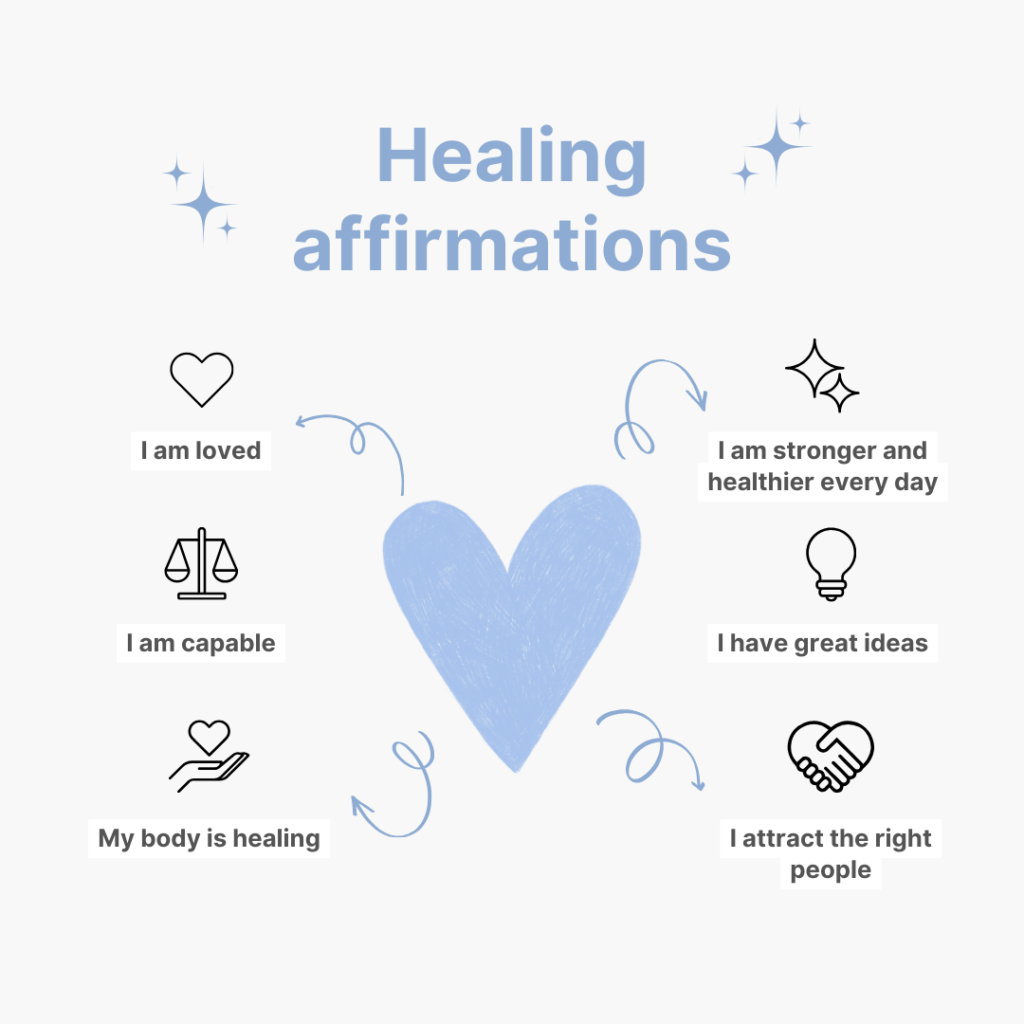Affirmations are more than just words; they are powerful tools for healing.
I’ve used affirmations in my life to beat depression, foster a deep belief in myself, and heal childhood traumas that plagued me for years.
In this article, you will learn:
- The science and psychology behind how affirmations can aid in healing.
- A curated list of powerful affirmations specifically designed for healing.
- Practical tips on how to use these affirmations effectively for personal growth and healing.
As we delve into the world of affirmations for healing, let’s explore how simple phrases can make a profound impact on our journey to health and harmony.
Table of Contents
The Power of Affirmations in Healing

Some may think it sounds silly, but affirmations — simple, yet potent phrases repeated with intention — can actually change your life. They certainly did for me!
Positive affirmations can act as a bridge between our conscious and subconscious minds, aligning our thoughts with our actions and beliefs. This alignment is crucial in the healing process, whether it’s emotional, physical, or better mental health.
Don’t just take my word for it — there is science backing up the power of affirmations.
Studies in neuroplasticity demonstrate that positive self-affirmations can rewire our brains, fostering positive thinking and resilience. Psychologists have observed that affirmations can significantly reduce stress, improve performance, and increase our ability to handle challenging situations.
For instance, a study published in the Journal of Psychology found that affirmations could increase problem-solving abilities under stress.
When it comes to emotional healing, affirmations can counteract our often self-critical inner voice. You know what I’m talking about; that voice inside your head saying “I’m not good enough”, “I’m not pretty enough”, or “I’m not smart enough”.
Screw that voice!
By repeatedly affirming your worth, strength, and ability to heal, you gradually shift your internal dialogue from negative to positive. It doesn’t happen overnight; it took me several weeks of repeating affirmations in the mirror and in my journal to notice a change.
But the more you do it (with conviction!), the faster you heal and change your inner dialogue.
Believe it or not, the impact of affirmations is equally profound for physical healing. While they’re not a substitute for medical treatment, affirmations can complement it by fostering a positive mindset, which is a critical factor in recovery.
The mind-body connection, widely recognized in holistic medicine, emphasizes that our mental state can influence our physical health. Positive healing affirmations can play a vital role in this connection, aiding the body’s natural healing process.
If you want to learn more about the power of affirmation for healing the body, I highly recommend checking out the work of Dr. Joe Dispensa, such as his book Evolve Your Brain: The Science of Changing Your Mind.
Crafting Effective Affirmations for Healing

Creating positive affirmations for healing is an art that combines intention with the right choice of words. Affirmations work best when they are personal, positive, and present tense; resonating deeply with your individual healing journey.
Here’s a guide to creating your own healing affirmations:
- Personalization: Your affirmations should speak directly to your experiences and aspirations. For instance, if you are healing from emotional trauma, an affirmation like “I am becoming stronger and more resilient every day” can be more impactful than a generic positive statement.
- Positivity: The language of your affirmations should be positive and uplifting. Instead of focusing on what you want to avoid or overcome, center your affirmations around what you wish to achieve or become. For example, say “I am at peace and in good health” instead of “I am not sick.”
- Present Tense: Affirmations are most effective when phrased in the present tense, as though the healing is already happening. This helps your mind accept these statements as current reality. An affirmation like “I am healing and growing stronger each day” is more powerful than “I will heal.” Be in the present moment.
- Simplicity and Clarity: Keep your affirmations simple and clear. Complicated or vague statements can be less effective because they might not resonate as strongly with your subconscious mind.
- Repetition and Belief: Repeating your affirmations regularly and believing in their power is crucial. Consistency helps to reinforce these positive statements in your mind, gradually transforming your thought patterns and beliefs. Make them a part of your daily routine.
Remember, the goal of affirmations is not just to repeat words but to foster a genuine belief in the healing process. As you create and use your affirmations, focus on the feelings and beliefs they evoke, nurturing a mindset conducive to healing.
It might feel silly to look in a mirror and say things like “I am abundant” and “I am attractive”. But feeling silly is part of the process! You’re meant to have fun with it and to truly believe and resonate with the words. Keep going, even if you feel weird or dumb at first.
9 Healing Affirmations You Can Use Right Now
Affirmations can be tailored to address various types of healing — be it physical, emotional, or mental. Here is a list of carefully curated daily affirmations to assist in your emotional well being:
For Physical Healing:
- “Every cell in my body vibrates with energy and health.”
- “I am healing a little more each and every day.”
- “I have a healthy body that can repair itself.”
For Emotional Healing:
- “I allow myself to heal from the pain of my past.”
- “I am worthy of love, happiness, and healing.”
- “With every breath, I release the anxiety and fear within me.”
For Mental Healing:
- “I am in control of my thoughts and emotions.”
- “I am surrounded by peace and calm.”
- “My mind is clear, focused, and serene.”

Using these affirmations consistently can play a significant role in your healing process. Feel free to adapt them to better suit your personal circumstances and needs. The more these affirmations resonate with you, the more effective they will be.
Some of the affirmations I’ve used in my own healing journey have been:
- “I am worthy and abundant.”
- “Money comes to me easily.”
- “I have loving and healthy relationships.”
- “I attract the right people for my success.”
- “People love being around me.”
My healing journey involved a lot of issues around abandonment and feeling unloved and unworthy, particularly if I didn’t feel like I was smart enough or working hard enough. I dealt with a lot of depression and suicidal thoughts.
While these affirmations alone didn’t do all the work of fixing my mental health, they played a crucial part alongside journaling, therapy, and exercise. Without these affirmations, I may not have fostered such a strong sense of belief in myself.
Integrating Affirmations into Daily Life

Incorporating affirmations into your everyday routine is key to maximizing your healing potential. Here are some practical tips to seamlessly integrate affirmations into your daily life:
- Morning Ritual: Start your day with positive morning affirmations. Recite them during your morning routine—while showering, brushing your teeth, or having breakfast. I personally like to say them to myself while looking in the mirror. This sets a positive tone for the day ahead.
- Affirmation Alarms: Set reminders on your phone throughout the day with different affirmations. These periodic prompts can help keep you centered and focused on your healing journey.
- Visual Cues: Place affirmation notes in visible areas around your home or workspace — on the fridge, bathroom mirror, or computer monitor. You can also make them your phone background. These visual cues serve as constant reminders of your healing intentions.
- Meditation and Mindfulness Practices: Incorporate affirmations into your meditation or mindfulness practices. While in a relaxed state, repeating affirmations can have a more profound impact on your subconscious mind.
- Bedtime Routine: End your day with affirmations. This practice helps your mind process these positive messages during sleep, reinforcing their effectiveness. If you have a partner, consider saying affirmations to each other as a fun way of connecting before bed!
- Journaling: Write down your affirmations in a journal. This not only reinforces the message but also allows you to track your progress and reflect on your healing journey. Journaling has been one of the most important habits in curing my depression and creating a better life for myself, so consider trying it!
Remember, the key to effective affirmation practice is consistency and belief.
You should try to imagine what your body and mind would feel like if you were already healed. Visually go there and feel your body without pain, or your mind with positive thoughts.
Putting yourself in that space not just through words, but also visualization as if the reality already were, can speed up the healing process.
Common Challenges and Solutions in Using Healing Affirmations
While affirmations can be powerful tools for self-healing, it’s common to encounter obstacles in using them effectively. Here are some typical challenges and ways to overcome them:
- Skepticism: It’s natural to be skeptical about the effectiveness of affirmations, especially if you’re new to the practice. Overcome this by starting with affirmations that feel believable and gradually moving to more ambitious statements. Research on the benefits of affirmations can also bolster your belief in the practice. There’s science backing this stuff!
- Forgetting to Practice: Consistency is key in affirmation practice, but it’s easy to forget in the hustle of daily life. Set reminders or incorporate affirmations into existing routines, as mentioned earlier, to maintain regular practice.
- Feeling Silly or Self-Conscious: If saying affirmations out loud makes you feel self-conscious, try writing them down or repeating them silently in your mind. Remember, the effectiveness of an affirmation comes from its meaning to you, not how it’s expressed.
- Lack of Immediate Results: As I said before, healing and mindset shifts take time. Mine took a few weeks before I noticed a difference, so don’t be discouraged if you don’t see immediate changes. Affirmations are a practice of patience and persistence. Regularly remind yourself why you started and the benefits you’re seeking. Again, journaling can help with this!
- Negative Thought Patterns: Replacing deeply ingrained negative thinking with positive affirmations can be challenging. When you notice negative thoughts, consciously pause and redirect your focus to your affirmations. This takes practice but can gradually lead to a more positive mindset. You’re literally re-wiring your brain!
- Customizing Affirmations: Sometimes, generic healing affirmations you find online may not resonate with your specific situation. Tailor affirmations to your personal experiences and feelings for greater impact. What do YOU want to be true about yourself and your life? Make that an affirmation.
Overcoming these challenges is part of the journey towards healing and self-improvement. Affirmations are a tool, and like any tool, their effectiveness depends on how they are used.
Conclusion
Throughout this article, we’ve explored the healing energy of affirmations. From understanding the science behind why they work to learning how to craft and effectively integrate them into your daily life, affirmations emerge as more than just words; they are catalysts for positive change and healing.
Key takeaways include:
- Affirmations harness the power of positive thinking and neuroplasticity to aid in healing.
- Crafting personalized, positive, and present-tense affirmations can significantly enhance their effectiveness.
- Integrating affirmations into daily routines ensures consistency, reinforcing their impact on our thoughts and beliefs.
As you continue on your journey of healing and self-discovery, remember that the power of affirmations lies in their regular practice and your belief in their potential.
To deepen your understanding and practice, consider exploring related topics such as mindfulness meditation or cognitive-behavioral techniques, which complement the practice of affirmations.
You might also consider coming to one of our wellness retreats at The Portal at Witch Well in Arizona! We discuss affirmations, mindfulness practices, and other methods for deep healing.
Embarking on a journey with affirmations is a step towards not just healing, but also towards a deeper understanding and connection with oneself. May your path be filled with positivity, growth, and profound healing.


